School News
HGCSC Supporting Wellbeing and Mental Health
Maintaining wellbeing
Just like our physical health, our mental health is really important. Having good mental health and looking after our wellbeing should be a priority, however, we know this can sometimes be difficult. Making a few changes to your daily life by getting in exercise, sleeping well, enjoying a good diet, taking time out for yourself or doing the things you enjoy, will all contribute to maintaining good wellbeing. Taking steps to support your wellbeing is helpful to prevent a decline in your mental health which can lead to more serious mental health issues.
Check out the information and suggestions below to stay mentally healthy!
Check out NHS Every Mind Matters
Click the link and scroll down to the self-help wellbeing videos:
https://www.nhs.uk/oneyou/every-mind-matters/youth-mental-health/
Young Minds
www.youngminds.org.uk have lots of helpful advice and information around mental health.
Epic Friends
www.epicfriends.co.uk information about mental health for young people.
Top Tips Whilst Learning from home
Trying to maintain normality wherever possible is really important for our mental health. We thought we’d share some simple top tips around this:
o Maintain a usual sleep routine, going to bed at a reasonable hour and setting an alarm to wake the following day.
o Change out of nightwear and get yourself ready for the day as you usually would.
o Stick to usual mealtimes to maintain structure and routine to your day.
o Set up an appropriate workspace to complete schoolwork, have equipment to hand and sit on a chair that supports your back.
o Try and get outside each day, whether that be for a walk or simply just to take in fresh air and natural light. Your body will thank you for it; natural light has many body benefits as well as serving as a break from technology and the same 4 walls!
o Make plans for the weekend so you all have something to look forward to, it could be a long walk or perhaps plan a nice meal or take away as a treat, organise a family video call and have fun doing a quiz, bingo or a game!
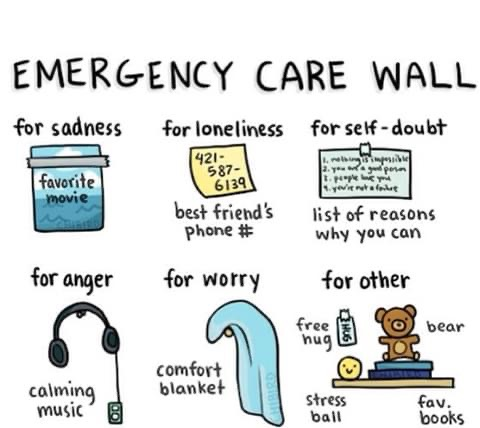
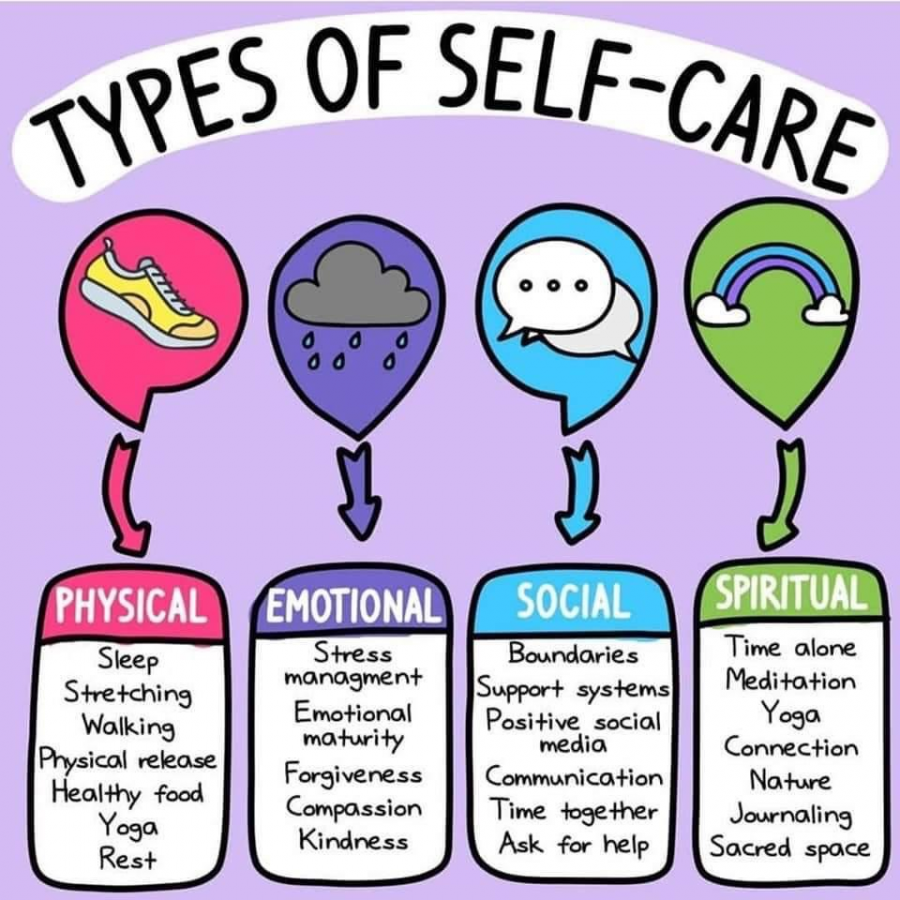
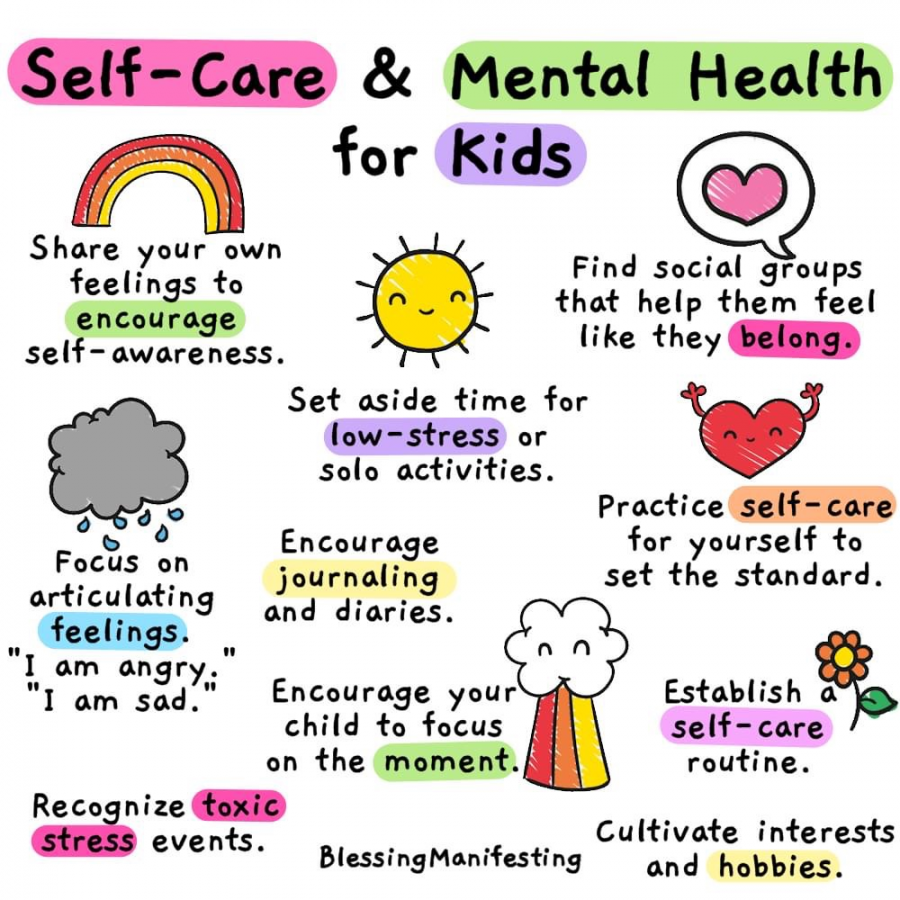
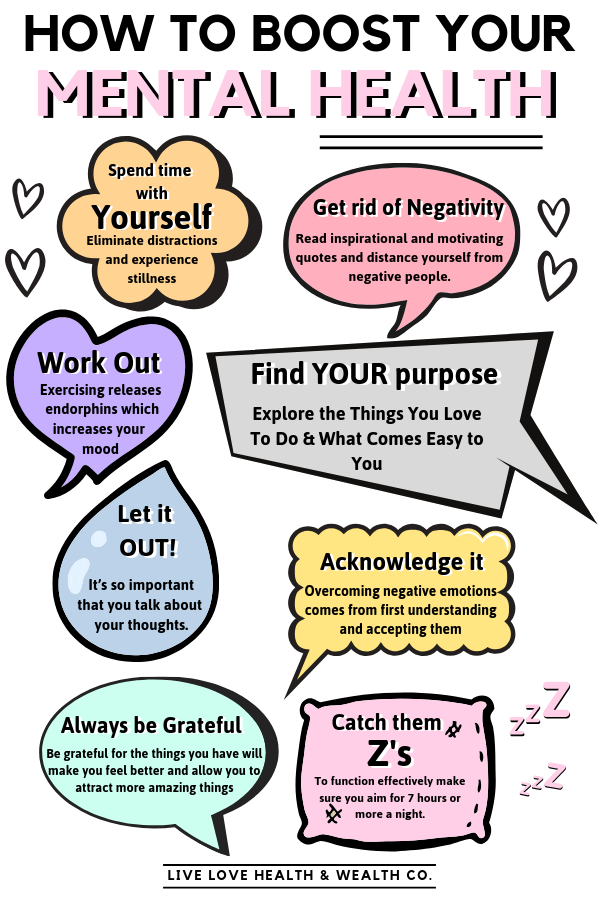
NHS Five Ways to Wellbeing

Looking after your Child’s Mental Health
Young Minds offer a Parent helpline for detailed advice, emotional support and signposting about a child or young person up to the age of 25.
Call for free on 0808 802 5544 from 9:30am - 4pm, Mon - Fri.
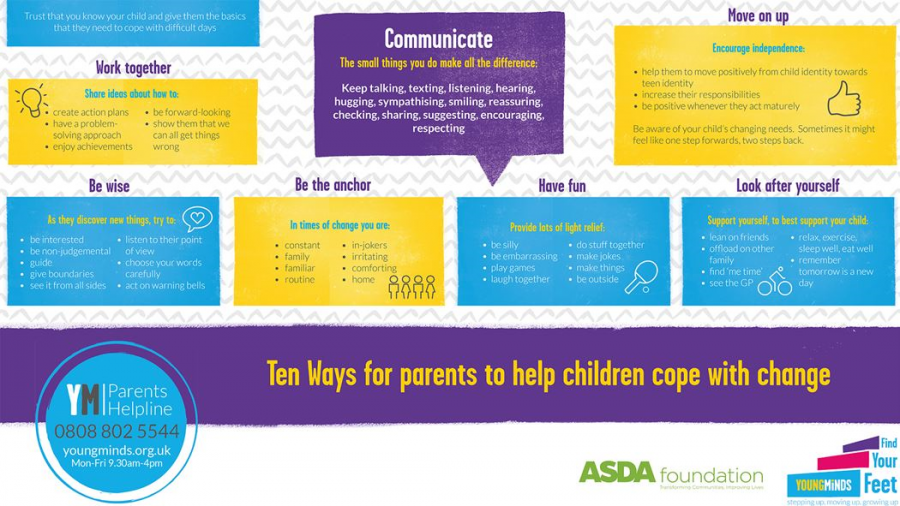
Managing feelings of Stress or anxiety
It is normal to feel stressed, overwhelmed or worried about things. Why not give some of these suggested activities a go to help relieve some of those feelings:
Create a Self Sooth box that you can pull out when you are not feeling at your best:
https://www.youtube.com/watch?v=OyfgodSSdV4
Your box should sooth all 5 of our senses:
o Smell- put things in that you like the smell of; candles, perfume for example
o Touch – things you like the feel of; bubble wrap, something fluffy
o Taste- something you like the taste of or that has a strong taste’ your favourite chocolate bar or Mints to refresh you
o Hear- things you like the sound of; relaxing music or music that lifts your mood, podcasts
o See – something visual you like, pictures of family and friends, a glitter jar that you can shake and watch settle. (you can make your own using a jar or water bottle filled with water and glitter).
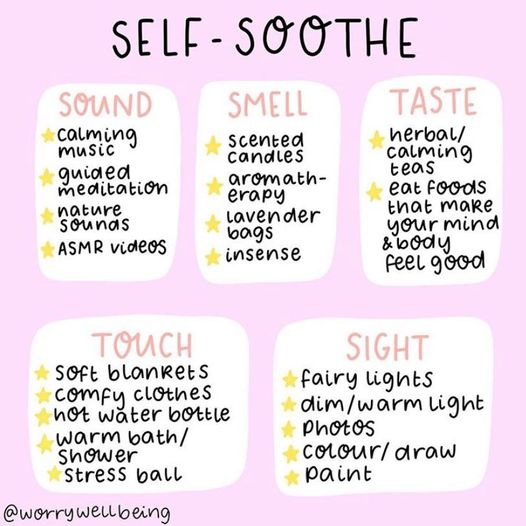
If you are feeling overwhelmed or stressed and need to relax or take some time out, try some mindful breathing or relaxation:
https://www.youtube.com/watch?v=wfDTp2GogaQ
https://www.youtube.com/watch?v=9GURt2pvdAg&t=114s
Why not try some mindful colouring?
You could Google Mindful colouring and print colouring pages out or create your own on paper. Get lost in a world of colour! Add various colours and detail.
Distract yourself!
Try a wordsearch, dot to dot, spot the difference, crossword puzzle. These all offer our brain a break from technology and a space away from whatever is buzzing around in your head.
Sleep
If you are struggling to sleep there are some really easy things you can do to try and help.
o Trying to maintain as ‘normal’ of a daily routine as possible helps your body to know the difference between night and day. Avoid long lay ins and staying up until the early hours as this will disrupt your natural body clock- we need this to function well!
o Try to keep studying out of your bedroom so that your body associates your room as a place of rest. Don’t use your bed as a workspace, dining table or gaming station.
o Open your curtains in a morning so your body gets much needed, white light.
It is all about the hour before bedtime!
Think about what you currently do in the hour before bedtime; playing on your phone, video games, watching tv, last minute schoolwork, consumption of fizzy drinks, caffeine or eating chocolate or sugary foods- this is all very stimulating!
A number of small changes can help:
• Turn off all technology at least one hour before bedtime- this includes TVs on in the background and playing on your phone in bed!
• A quiet, calming activity (15 mins) such as reading, drawing, colouring, breathing exercises, mindfulness, playing with slime/squishie, wordsearch, puzzles or Lego will help our body to relax
• A warm shower or bath
• Changing into PJs to let our body know its different time of day
• Close curtains/blinds and dim bedroom lights
• Write things down if something is playing on your mind- try and empty your mind before sleep!
• Avoid napping during the day as this will disrupt the body’s natural body clock and confuse it when it comes to bed time!
• Exercising too close to bed time can awaken our body- exercise during the day or atleast a few hours before sleep
• A bedtime snack can also help your body produce the
Click the link below for some really helpful videos around sleep- if you are struggling to get a good night's sleep this could help. Sleep is very important for your physical and emotional health and plays a huge part in your daily functioning:
https://vimeo.com/user112696016/videos
Teen Sleep Hub offers lots of useful help and information as well as an E book you can download for free:
Teen Sleep Hub also have a live chat every Tuesday and Thursday 4pm-6pm where you can ask sleep practitioners questions about sleep or for advice on how to get a good night’s sleep.
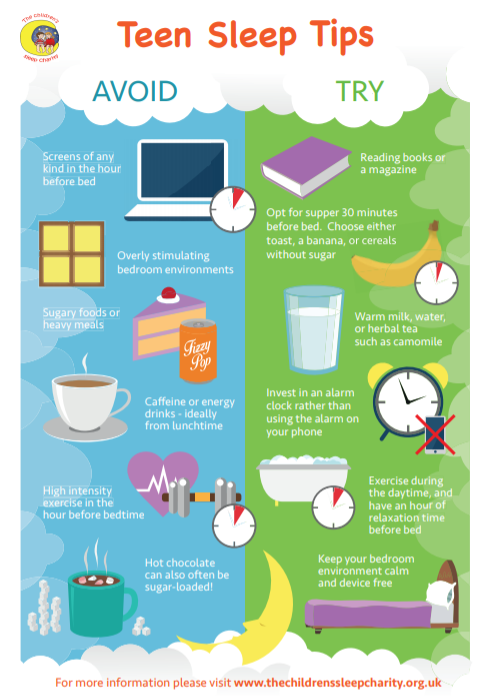
Exercise
"If exercise were a pill, it would be one of the most cost-effective drugs ever invented," says Dr Nick Cavill, a health promotion consultant. NHS.
Exercise is really important right now for both our physical and mental health. It offers time away from technology, a space to forget about reality and release those all-important feel good endorphins! If you choose to exercise outdoors there are added benefits; white light on our skin helps your sleep-wake cycle (meaning you’ll sleep better at night!) Whilst outdoors you can take in the fresh air, appreciate the nature around you or even just a change of scenery from the same 4 walls!
If staying indoors YouTube has tons of home workout videos, Joe Wicks ‘The Body Coach’ for example has videos that are easy to do at home, don’t require equipment and last around 20 minutes. Short but intense enough to get your heart pumping! https://www.youtube.com/watch?v=q20pLhdoEoY
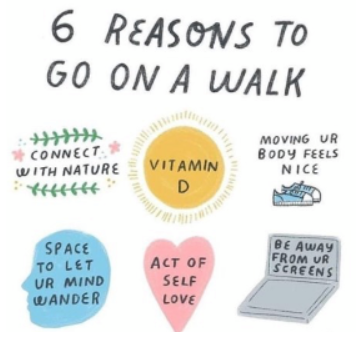
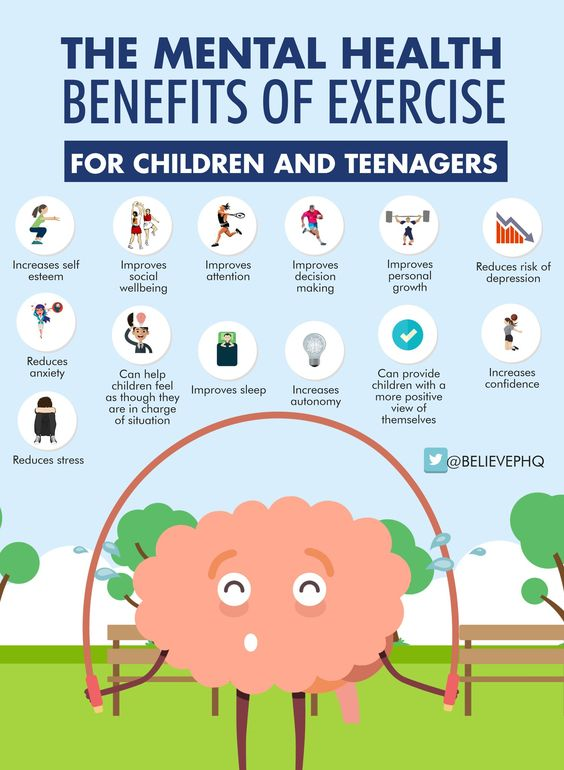
Get Support
www.kooth.com offers free online counselling to all young people in Sheffield, you can log on and speak to a trained counsellor about anything.
Childline offer a 1-1 online chat on their website or via their ‘For me’ App. Childline is there to help anyone under 19 in the UK with any issue they’re going through.
You can talk about anything. Whether it’s something big or small, our trained counsellors are able to support you. You can also call them on 0800 1111 from 9am-midnight.
SHOUT: If you’re experiencing a personal crisis, are unable to cope and need support, text Shout to 85258 anytime.
If your life is in imminent danger, please call 999.
Shout can help with urgent issues such as:
• Suicidal thoughts
• Abuse or assault
• Self-harm
• Bullying
• Relationship challenges
In school support
Some pupils are receiving regular telephone calls or video call from their heads of year or Rochelle and Bev. Please contact your Head of Year if you feel this is something you feel you would benefit from.
You can also email wellbeing@hgcsc.co.uk to ask for support.
Useful Apps
There are lots of great apps out there that are useful for supporting mental health and wellbeing. Here are a few Free apps that we recommend:
MyLife Meditation: Mindfulness
allows you to check in with your emotions and recommends short, guided meditations to respond to how you are feeling.
Clear Fear
the fear of threat, or anxiety, is like a strong gust of wind. It drags you in and makes you want to fight it or run away. Face your fear with the free Clear Fear app and learn to reduce the physical responses to threat as well as changing thoughts and behaviours and releasing emotions.
Catch it
Learn how to manage feelings like anxiety and depression with Catch It. The app will teach you how to look at problems in a different way, turn negative thoughts into positive ones and improve your mental wellbeing.
Calm Harm
provides tasks that help you resist or manage the urge to self harm.
For Me
Childline’s app to get advice and support on loads of topics along with access to trained counsellors.

